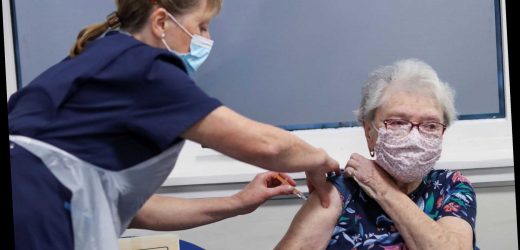COVID vaccines will be available from GP surgeries from today – as the race to protect Brits from the virus is ramped up.
The Oxford/AstraZeneca jab can be stored at fridge temperatures making it easier to administer, unlike the Pfizer jab which requires storage at -70C.
⚠️ Read our coronavirus live blog for the latest news & updates
It's hoped more than 700 GP surgeries will be delivering vaccines by the end of the week – after the UK recorded the highest daily death toll since April.
The UK reported a further 1,041 people had died within 28 days of testing positive for Covid-19 as of Wednesday.
Record numbers are also currently in hospital with coronavirus, with a further 3,500 admitted in England on Monday.
Some 1.3 million people have already received either the Pfizer/BioNTech or Oxford/AstraZeneca jab.
And millions of extra Covid vaccines could be ready within weeks as approval times for fresh batches are slashed to just five days.
The jabs will be given to those deemed most vulnerable to the virus first – and are currently being offered to people aged over 80 in hospital, frontline health staff and care home workers.
With the roll out of the Oxford vaccine, the aim is to vaccinate every care home resident by the end of January, while all over 70s and those who are clinically extremely vulnerable by mid-Feburary.
Other priority groups will then be invited for their jabs, possibly by Easter.
The rest of the population – mainly those under 50 – will be in the second vaccination phase, but teachers transport workers and the military could be prioritised.
As soon as it's your turn to get the vaccine, you will be invited either by phone or letter.
JAB BOOST
Testing of Covid vaccine batches is set to be accelerated from 20 days to just five to get jabs out more quickly across the UK, it's reported.
And a new single-shot Janssen vaccine – developed by pharmaceutical giant Johnson & Johnson – could be approved for use by next month.
The Medicines and Healthcare Regulatory Agency, which is responsible for the checks, is also to increase staffing in a bid to accelerate the mass vaccination programme, reports the Daily Mail.
Faster rollout of the jab campaign is needed to speed up the end to lockdown by vaccinating more than 13m of the most vulnerable Brits by mid-February.
Up to now the MHRA’s National Institute for Biological Standards and Control has only checked batches one by one at its site in Hertfordshire.
But the process has been changed so more than one batch can be assessed at a time, cutting the timescale from up to 20 days to around five.
“We are working closely with the manufacturer, AstraZeneca, to ensure batches of the vaccine are released as quickly as possible,” said an MHRA spokesman.
“Biological medicines such as vaccines are very complex in nature and independent testing, as done by the National Institute, is vital to ensure quality and safety.
“The institute has scaled up its capacity to ensure that multiple batches can be tested simultaneously, and that this can be done as quickly as possible, without compromising quality and safety.”
DOSING REGIMEN
Despite plans for a quicker turnaround of vaccine batch approvals, both the Pfizer and the Oxford doses need to be given as two separate doses, some weeks apart.
But there are plans for the launch of a new single-dose vaccine, that could mark a huge acceleration in giving more Brits immunity from Covid-19.
Ministers hope the Janssen jab, using similar technology to the Oxford vaccine, could be granted emergency authorisation within weeks, reports The Telegraph.
The UK has already ordered 30 million doses of the Janssen vaccine, with the option of 22 million more.
If approved by regulators, the Janssen drug would become the third vaccine to be rolled out at scale in the UK after the Pfizer and AstraZeneca jabs.
It can be stored at standard fridge temperature and trials have so far focused on its effectiveness when used as a single dose, which marks a big change from the double-dose vaccines currently available.
Meanwhile, seven mass vaccination centres will open next week in London, Newcastle, Manchester, Birmingham, Bristol, Surrey and Stevenage.
Vaccines minister Nadhim Zahawi admitted the target of vaccinating around 14 million people in the highest priority groups – including the elderly, those with clinical needs, care home residents and staff as well as frontline NHS workers – by February 15 was "stretching".
Boris Johnson was given approval for the latest lockdown in the Commons but faced rebellion within his ranks, with 12 Conservative MPs voting against the stay-at-home rules. They were joined by four DUP MPs opposing the regulations.
In the face of pressure from senior Tories to commit to easing the restrictions – which came into force on Wednesday and were being voted on retrospectively by MPs – as soon as possible, Mr Johnson said there would be "substantial opportunities" for relaxation before March.
Mark Harper, ex-government chief whip and chairman of the lockdown-sceptic Covid Recovery Group, said the restrictions should be reviewed "in the middle of February" once the most vulnerable had been vaccinated, as per the Government's aim.
Vaccines available to the UK
THE UK government has placed orders for seven different vaccines – totalling more than 300 million jabs
- AstraZeneca/Oxford university – 100 million doses – Approved
- Pfizer/BioNTech – 40 million doses – Approved
- Janssen – 30 million doses – Phase 3 trials
- Moderna – 5 million doses – Phase 3 trials
- Novavax – 60 million doses – Phase 3 trials
- Valneva – 60 million doses – Phase 1/2 trials
- GSK/Sanofi – 60 million doses – Phase 1/2 trials
The result came as Government data confirmed that the Covid death toll had once again reached levels not seen since the peak of the first wave in 2020.
The figures, however, continue to be affected by a lag in the publication of recent data and contain some deaths that took place over the Christmas and New Year period that have only just been reported.
Of the 1,041 new deaths, around a third took place before January 1, while some 100 took place in the seven days up to Christmas Day.
After the latest mortality figures were released, Labour leader Sir Keir Starmer said ministers had to shoulder some of the blame.
"This is a tragedy. It's not bad luck. It was not inevitable," he tweeted.
"The Government has been too slow to react. We now need a national effort to get our country vaccinated."
Source: Read Full Article








